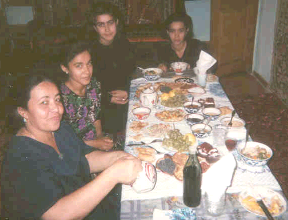
Pastor’s Storybook III–8

Learner follows Mr. Wise’ example of regularly visiting the new leaders that he trains. In Helper's house, he asks, “How is your congregation progressing?”
Helper answers, “I am worried. Caregiver’s family has malaria again. He is discouraged. His son also broke his leg. His wife is depressed and sits weeping and staring into space. Can you talk to them?”

They visit Caregiver’s family and are surprised to find Mr. Foolish there. He tells Learner, “Caregiver’s wife, Carmen, is my sister. I came to ask my-brother-in-law for a loan because my sales have been low lately. But he lost his teaching job because of his illness. Perhaps you can help me.”
Learner tells him firmly, “I have told you several times that I do not make loans. Caregiver and Carmen are the ones that need help.”
Mr. Foolish says to Caregiver in front of his wife Carmen, “You have this trouble because you and your family have sinned too much. You are not really saved by Jesus because if you were true Christians you would not suffer so much.” Carmen runs from the room weeping loudly.
“I refuse to listen to this!” Caregiver shouts. He walks out of his house. Learner and Helper go after him. He tells them, “Mr. Foolish has disturbed my family too much. We are leaving the church.”
Helper tries to persuade him to continue participating but he will not listen. Learner returns home and prays with Sara. He hurries to the house of Mr. Foolish and rebukes him, “Your sister Carmen’s family has left Helper’s congregation because you discouraged them.”
“I’m glad!” Mr. Foolish replies, “The church is better without that stingy man. Carmen never should have married him.”
Learner
feels angry but says nothing. The next day he returns to visit Helper
and encourage him. He takes a study that Mr. Wise had provided, to
deal with discouraged Christians. He finds Helper in his house
playing a sad tune on his guitar. Learner reads to him, “A
basic ministry is to visit our people and counsel them. Here are
practical ways to help each other trust in God and rejoice, even when
life is painful. God’s Spirit is called our Counsellor. Learn
about The Discouraged Prophet, to discover how God helped him.”

Find in 1 Kings 19:1-18:
Why was Elijah very discouraged? Read chapter 18 also if you want to learn the whole story.
What help did God send first, in chapter 19, to help Elijah?
What were God’s first words to Elijah in the cave?
How did Elijah know when God was speaking to him?
What
did God tell Elijah to do, to encourage him?
Rachel brings tea for Learner as Helper reads from the study, “Even brave prophets of God got discouraged. God gave Elijah power to do great miracles, but when queen Jezebel threatened to kill him, he fled, afraid. He ran far and became physically exhausted. He left his servant behind and went on alone, which was a mistake. He needed company. He wanted to die. Part of his discouragement came because his body was tired. God sent an angel with food and water and let him sleep until his body recovered. Then God spoke to him. God’s first words were a question, ‘Why are you here?’ God listened to Elijah first. God used a gentle, calming whisper to speak to Elijah, not an angry storm. Finally, God gave Elijah a reason to live. He gave Elijah a job to do and new hope in His power.”
They read 1 Kings 19 again. Learner says, “We will follow the example of the Great Counsellor. When we know that people are discouraged, we visit them. First, find out if there is a physical reason for their trouble. Are they tired, hungry, or sick? Pray for healing and tend to their physical needs. Then ask questions to find what is wrong. Listen with patience for the real reason why people are discouraged or upset. Be gentle. God speaks to hurting people through our compassion, but not through our anger.”
Helper says, “I need to do this for Caregiver and his family. I should talk privately with him, like God did with Elijah, in a soft voice.”
Helper reads from the study, “Never repeat to others bad reports that you have heard, unless you are absolutely sure they are truthful and not exaggerated. Avoid gossip. Give discouraged believers hope by reminding them of who they are in Christ. Ask them to say the encouraging words in Ephesians 1:3-14 aloud and claim each precious promise. Let them read the verses or repeat them after you. Often they have sin in their lives that they have not confessed to God. Help them confess their sins. Help them to forgive anyone that has done them wrong, especially people in their own family. Assure them of God’s forgiveness. Finally, help them find practical ways to serve God, even in difficult situations.”
Helper lays down the study and exclaims, “Yes, I will do this! I will organize the ministry of visiting and counselling in our congregation. I am meeting with our workers tonight. Please stay and help me, Learner!”
Find
in Ephesians 1:3-14 several precious promises to
encourage
believers in Christ.
That night Helper explains to the other workers of his new congregation, “Our people face problems that we can deal with only by visiting them in their homes. Some are in conflict with another person, usually in their own family. Others are sick, old and feeble, or unemployed. Some struggle with drunkenness, bad drugs or sexual problems. Some new believers are unsure of their salvation and their place in Christ's church. Many have friends and relatives that do not yet know Jesus. Let us organize so that every new believer receives regular visits by someone else. Learner, please tell us what to do.”
Learner wisely advises, “You are the leader here. You know what to do. You tell them.”
Helper says to the group, “Go in pairs. Men visit men and women visit women. Avoid gossip. Husbands and wives can visit families together. Pray with the people that you visit. Use the stories that I have taught you, to tell people about Jesus and solve their problems. You more mature believers, go with the new ones to visit their unsaved friends, and help the new believers to learn quickly what to say. Remember, we are all shepherds like Jesus, our Great Shepherd. We all take care of His sheep with love and compassion. Be considerate! Do not interrupt people when they are eating or working. Be clean, respectful and gentle. Demonstrate for them what Jesus is like.”
Helper and Learner visit Caregiver’s family that left the congregation. Again Helper asks Learner to talk with Caregiver's family but Learner refuses, saying, “You are their shepherd.”
Helper tells Caregiver and his family about how Job suffered. “Job’s
friends tried to comfort him when he was sick, bereaved and in pain,
but they only made him more miserable. They kept saying that he
suffered because he was bad. Job wanted to ask God why he was
suffering so, because he saw wicked people living in ease. Let me
explain How Those who Are in Pain Receive Comfort.”
Find in Job chapters 1 and 2:
How did God test Job’s faith?
Did Job understand why God was testing him?
Now find in Job chapters 38 and 42:
How did God answer Job?
What
happened to him in the end?
In Caregiver's house, Helper comforts him and Carmen. “Suffering comes to us for many reasons. We bring suffering on ourselves because we do foolish things. God also uses sickness to correct us, to help us remember Him, or to take us home to heaven. He allows suffering to test and strengthen our faith. Sometimes He heals us with His power. Sometimes He shows His strength in our weakness, as Paul told the Corinthian church.”
Carmen
and the children go to bed, but Caregiver wants to learn more. Helper
explains Paul’s Attitude Toward Suffering.
Find in 2 Corinthians 1:3-7 the main source of our comfort.
Find in 2 Corinthians 4:7-12 what a believer's suffering in his body portrays.
Find in 2 Corinthians 12:7-10 a reason why God allowed Paul to suffer.
Helper continues to pray with Caregiver and comforts him, “God
does not want to make us suffer. Jesus came to take our suffering on
His own shoulders. If we trust God, He will bring something good from
our suffering, like He brought good from the suffering of Jesus, Paul
and Job. Now let me explain about The Blind Man Whom No One
Believed.”
Find in John chapter 9 some good things that happened because of the man’s blindness.
Find in James 5:13-20 words of advice for people facing both good and hard times.
Find
in Hebrews 12:5-12 an important reason why God punishes believers that
keep committing a sin.
When they leave Caregiver’s house, Learner tells Helper, “You counseled well. I knew you would. That’s why I kept silent.”
The next day Helper takes his wife Rachel to visit Caregiver’s wife Carmen. Rachel has also read the studies about visiting and counseling. She explains to Carmen, “Your suffering does not mean that God has abandoned you.”
Later they meet together to try to find the root cause of their discouragement. Caregiver says, “I know what the root is. I let my family forget God’s faithfulness. We have not been praying as a family. Let us pray together now and ask God to bring good from our suffering, like He did for Job.”
Some
members of Helper’s congregation bring food to the family and
continue to help them for several days. The family’s faith
grows strong and they return to the congregation. Soon God heals
their physical ailments also. Caregiver begins visiting others to
tell about Jesus and comfort them. He likes to explain to those
helps, “God used bad things to bring good things to us.”

During
a worship service Helper announces, “The congregation
recognizes the compassionate care that Caregiver and Carmen are
giving to many others. We will now lay hands on them to commission
them as deacons, as in Acts 6.” The group cheers.
Develop the ministry of visiting and counselling those who have problems. Find the people in your congregation who enjoy counselling others. Teach them to encourage and exhort them, using the stories in this section.
Arrange so that everyone receives an occasional visit, whether they have a problem or not.
Teach new believers to obey the basic commands of Jesus, listed in Section I.
Go with new believers to help them visit and witness to their unsaved friends.
Give special care to the elderly who are feeble, the sick, and those with other needs.